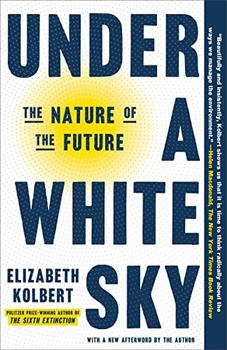Summary | Excerpt | Reviews | Beyond the book | Read-Alikes | Genres & Themes | Author Bio

The Nature of the Future
by Elizabeth KolbertThe Pulitzer Prize–winning author of The Sixth Extinction returns to humanity's transformative impact on the environment, now asking: After doing so much damage, can we change nature, this time to save it?
That man should have dominion "over all the earth, and over every creeping thing that creepeth upon the earth" is a prophecy that has hardened into fact. So pervasive are human impacts on the planet that it's said we live in a new geological epoch: the Anthropocene.
In Under a White Sky, Elizabeth Kolbert takes a hard look at the new world we are creating. Along the way, she meets biologists who are trying to preserve the world's rarest fish, which lives in a single tiny pool in the middle of the Mojave; engineers who are turning carbon emissions to stone in Iceland; Australian researchers who are trying to develop a "super coral" that can survive on a hotter globe; and physicists who are contemplating shooting tiny diamonds into the stratosphere to cool the earth.
One way to look at human civilization, says Kolbert, is as a ten-thousand-year exercise in defying nature. In The Sixth Extinction, she explored the ways in which our capacity for destruction has reshaped the natural world. Now she examines how the very sorts of interventions that have imperiled our planet are increasingly seen as the only hope for its salvation. By turns inspiring, terrifying, and darkly comic, Under a White Sky is an utterly original examination of the challenges we face.
Kolbert's narrative is informed and informative, and she doesn't avoid questioning the potential ethical dilemmas posed by these new innovations. Admittedly, gene editing and turning the sky bright white with sulfates, reducing the amount of sunlight reaching the Earth by two percent, could have unforeseen repercussions. However, as she presents ever-mounting evidence that current approaches for "saving the environment" simply don't work — in fact, have never worked — and other solutions exist, it's difficult not to be swayed...continued
Full Review
(751 words)
This review is available to non-members for a limited time. For full access,
become a member today.
(Reviewed by Ian Muehlenhaus).
Genetically modified organisms (GMOs) have received a bad rap. They're banned from being grown or used in food throughout most of Europe. They're caustically labeled on groceries in the United States. And they are frequently despised by foodies, farmers, environmentalists and the devoutly religious alike — for reasons ranging from health, to corporate greed, to technophobia, to ethics.
While there are valid arguments to be made against the use of GMOs, it's important to look at this issue from a balanced perspective. For some, anti-GMO sentiment is based more on anxiety than fact. For example, as Elizabeth Kolbert points out in Under a White Sky, GMO use may be the only way to save Australia from being overrun by toads!
A Brief ...
This "beyond the book" feature is available to non-members for a limited time. Join today for full access.

If you liked Under a White Sky, try these:

by Rebecca Renner
Published 2024
David Grann meets Susan Orlean in this page-turning true story of an underground operation into the mysterious world of alligator poaching and its larger than life Floridian characters

by Ben Goldfarb
Published 2024
An eye-opening account of the global ecological transformations wrought by roads, from the award-winning author of Eager.
Discovery consists of seeing what everybody has seen and thinking what nobody has thought.
Click Here to find out who said this, as well as discovering other famous literary quotes!